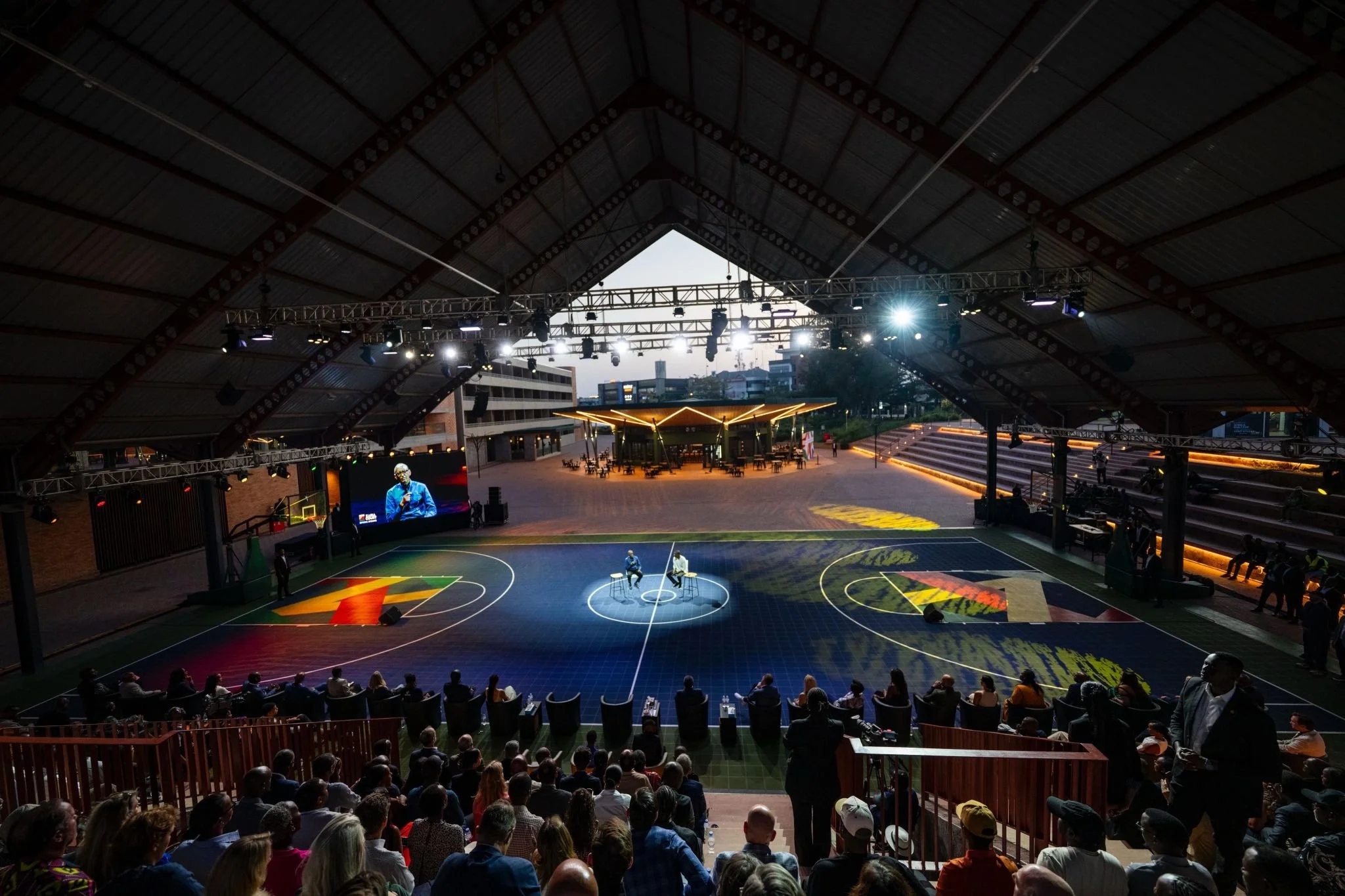From Venue to Ecosystem: Zaria Court unveils new a model for African sports infrastructure
By Sindiswa Mabunda
(Photo Credit: Kunle Adeyemi)
On Monday night, Zaria Court officially opened its doors with a high-profile launch event that brought together dignitaries, investors, athletes, and cultural leaders. While the grand opening celebrated a significant new landmark for Rwanda, it also signified the arrival of something much larger: a scalable vision for African cities built around the power of sports-led infrastructure. “This is our proof of concept of how that infrastructure can inspire similar developments across the continent,” said Andrew Feinstein, Managing Partner at Zaria Group. Situated between BK Arena and the revamped Amahoro Stadium, the $26 million mixed-use development is the first of its kind from Zaria Group, co-founded by NBA champion Masai Ujiri and Helios Sports and Entertainment Group. The flagship site features an 80-room boutique hotel, a 2,000-person event space, a public basketball court, football pitches, a podcast studio, co-working space, gym, restaurants, a sports bar, and curated retail. It’s not just a venue; it’s a community hub designed for Africa’s growing middle class, creatives, and entrepreneurs.
Cross-border capital and a pan-African expansion model
Bringing the Kigali vision to life required a combination of local credibility and global support. Feinstein explained, “We assembled a consortium of shareholders, including Helios Investment Partners through their Helios Sports and Entertainment Group Fund as one of our primary shareholders. It’s a mix of international investors and local stakeholders.”
The project was also funded by debt from the Bank of Kigali. This funding model, which integrates Helios’ institutional expertise with local financing from BK Capital and the Bank of Kigali, is intended to set a new standard.Zaria Court's development was a challenge, as it came together post-COVID amidst rising interest rates and difficult currency fluctuations. Despite these hurdles, investor interest is now increasing since its opening. Feinstein noted a significant demand: “I think there’s a huge appetite. We are fielding numerous calls and inquiries. Everyone wants to know: ‘When is your second one? How can I get involved?’” On the matter of expansion, Zaria Group has been clear: Zaria Court Kigali is the first of several planned flagship sites across the continent, with five developments expected by 2030. The Zaria team is actively evaluating cities such as Lagos, Abidjan, Nairobi, Johannesburg, Cape Town, Accra, and Dakar. “We are looking for markets that are not only growing economically but also wield significant cultural and societal influence on the continent. I believe all those markets fit the criteria,” Feinstein said. “Ideally, any site we tackle has a story; it should have an interesting history and cultural resonance with the local community. The team is refining the concept of what constitutes a Zaria Court. “In terms of scaling the model, we are focusing on what it takes to be a Zaria Court. We need enough physical space to accommodate sports facilities, lodging, whether a hotel or housing, and venues for gatherings and events. Future Zaria Courts will also include a sports bar and shopping spaces to benefit local entrepreneurs.”
From Venue to Ecosystem: A Shift in How Sports Infrastructure Is Built
Globally, sports teams and ownership groups are increasingly investing in real estate as a long-term strategy. A recent Klutch Sports-RBC report forecasts that over $100 billion will be invested in sports-focused real estate across the U.S. over the next 15 years. Zaria Court reflects a similar strategy for Africa, tailored to its fast-growing urban youth demographic. Purchasing a beer at a sports bar may seem like mere entertainment, but it is part of a larger sports ecosystem. As Feinstein points out, “There’s a whole food chain that comes with the business of sports. It is still nascent in Africa, but it is growing.” Feinstein and his team are aiming for a future where sports infrastructure becomes integral to urban development, job creation, and national brand-building. “Without a sports, hospitality, and entertainment district like Zaria Court next to your arenas, your stadiums will sit unused in a parking lot.” Zaria Court goes beyond being modeled after a U.S. sports district: the group’s model is deeply rooted in community engagement. This community-first design extends to youth access, retail incubation, and open spaces intended for non-ticketed guests. “We don’t just want people to visit; we want them to return. If people come back, that truly delivers value for Rwanda, in our opinion. “We can confidently say that Zaria Court will sustain about 500 jobs on an ongoing basis,” Feinstein said, noting that 90% of construction workers were hired locally and 40% of leadership roles during construction were filled by women.


